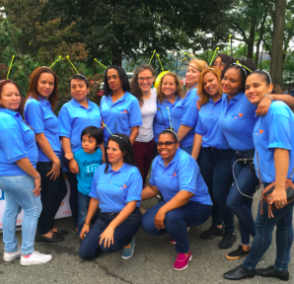 Worker Cooperative Developer at the Center for Family Life in Sunset Park Cooperative Development Program
Worker Cooperative Developer at the Center for Family Life in Sunset Park Cooperative Development Program
How did you first get into this work?
I came into the world of cooperativism having worked primarily at the intersection of gender, labor and sexuality. Every aspect of our lives here, in the context where most of us reading this live, is controlled by gender. We are controlled by race. There are historical and creative constructions of extractive patterns, binaries, expectations, narratives that very efficiently serve the ruling class. Unlearning is a critical struggle. Through cooperative work, I hope we can unlearn the limiting stories we’ve been told about ourselves in the effort to create cultures both internal and external to the organization that challenge the sexist racist status quo. It is very hard to avoid replicating deeply embedded oppressive systems. It doesn’t always happen, but we continue learning and growing in our effort to try.
What does ‘Solidarity Economy’ mean to you?
A solidarity economy recognizes everyone’s humanity in the struggle to build community. On an interpersonal level, solidarity requires recognizing everyone’s needs, skills, challenges, desires: It is when a cooperative provides supports to a member who cannot read or write, or utilizes need as a factor in determining jobs. It is equity. It is making the choice to spend a little more on services or food because it is produced with dignity and justice. For me, solidarity economy is specifically political, and requires intentional learning about the siloization and competition in the capitalist economy, the exploitation of people and land, so that we can build an economy grounded in collective control and stewardship of our resources – our existence and liberation depends on it.
What are the biggest challenges you face in this work?
There are many contradictions. I believe it is a contradiction to be a white worker in the non profit industrial complex which has become professionalized to reinforce boundaries and hierarchies. How do we transition into trusting and equity-based relationships given this structure? For me, it is a contradiction that non-profits are inherently capitalist; they are a capitalist construction given that foundation funding from the wealthy makes our organizational work possible. In my view this means we are dependent on an unjust system. I’d say that many of the cooperatives we organize also support capitalism: Domestic worker cooperatives, even with collective democratic culture and comparatively just working conditions, make it possible for capitalists to earn even higher wages. So are these really “just” working conditions? I see part of my work as managing and challenging the dissonance by continuing to have these conversations with cooperative members, my colleagues, my community.
Why do you think it is important for cooperatives to help other cooperatives?
Seeing this in action is one of my favorite experiences at work: a coop making an interest-free loan to another coop; members from multiple coops organizing an event with childcare, interpretation and food all provided by worker coops; cleaning coops across NYC coming together to share strategies for how to build their business as well as power to confront an oppressive industry; worker coops banking at credit unions while doing publicity at food coops. How do we expect to build equity, mutual support, wealth if we don’t do it amongst ourselves? Cooperation among cooperatives is about building power, confidence, economic sustainability, from the individual to the organization to the political: it directly challenges the isolation and competition that capitalism perpetuates.
What is your ‘theory of change’?
Non-profits are not the answer. The presidential election is not the answer. I believe the answer is creating a culture around mutual support and accountability, beyond the home or the workplace and across class and race identification, while making space to repair harm and confront inequity, using education to redistribute power, along with chosen family in the struggle for justice. I do the work that I do to support a movement that cultivates socioeconomic justice/wealth not only in wallets and assets, but in our hearts and minds and relationships. We all have a lot of work to do.
Where can we find more information about the work you are doing in the future?
Join the CFL Cooperative Development Program’s newsletter by emailing coopdevelopment@sco.org. You can also check out our fledgling FB page.
What is the best way for people to get involved and support your work?
Buy coop. Not just from food coops, but goods and services from worker coops (if you need a cleaning, check out www.upandgo.coop). Start scheming about how to shift your workplace into a coop. Talk to your family and followers about coops. Constantly strive to live your life with integrity…assuming that you want to tear down exploitation and build resistance through solidarity. Invest in each other, not the market! We’ll do better if we all try together.

